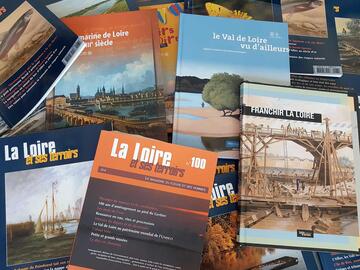
06/03/2025
[Fr] Décès de Philippe Auclerc
C'est avec tristesse que nous avons appris aujourd'hui le décès de Philippe Auclerc, co-fondateur de la maison d'édition "Loire et terroirs" et rédacteur...
Published on 15 June 2020 - Updated 04 January 2021
Cet article date d'il y a plus de 4 ans
Writer and lawyer Camille de Toledo is orchestrating and leading the work sessions of the Loire Parliament, an initiative supported by the POLAU - Arts & Urban Planning Centre, in which Mission Val de Loire is participating. In this interview, he tells us about how his talks are progressing with Bruno Marmiroli, Director of Mission Val de Loire, and Isabelle Reiher, Director of the CCCOD contemporary creation centre. This discussion forms part of the 2019/2020 conference cycle organised in partnership between Mission Val de Loire and the CCCOD.
In 2017, in New Zealand, a law granted legal personhood status on the country’s third largest river, the Whanganui, recognising it as a “unique living being”.
What if, on the Loire riverbanks too, we took a step outside the box? To consider the relationship between nature and us in a different way?
The findings today, and the challenges that lie ahead, for ecosystems, biodiversity and the continuation of human activities, are redefining the key issues shaping our societies. This is providing an opportunity to perceive them in a new light, and to usher in a shift in the paradigm that has previously defined common heritage.
The hearings of the Loire Parliament – an initiative supported by the POLAU - Arts & Urban Planning Centre in which Mission Val de Loire is participating – have that very purpose in mind.
Writer and lawyer Camille de Toledo is orchestrating and leading the work sessions. In this interview with Bruno Marmiroli, Director of Mission Val de Loire, and Isabelle Reiher, Director of the CCCOD, he tells us about how these talks are progressing.
This discussion forms part of the 2019/2020 conference cycle organised in partnership between Mission Val de Loire and the CCCOD.
Camille de Toledo is a writer, theoretician and artist. With a PhD in comparative literature, he lectures in the contemporary writing workshop at the National Graduate School for Visual Arts (ENSAV, La Cambre), in Brussels. Born into a Jewish family from Turkey, he studied history, law and literature. In 2004, he was awarded the Villa Medici scholarship. In 2008, he founded his first "potential institution", the European society of authors to promote "translation as a language", with such figures as Claudio Magris and Bruno Latour. In 2012, he moved to Berlin with his three children after the death of his brother and parents.
He has written influential works including Le Hêtre et le Bouleau, essai sur la tristesse européenne (2009), Vies potentielles (2010), L’Inquiétude d’être au monde (2012) and more recently Le Livre de la faim et de la soif(2017). Advocating the researcher position of writers and artists, he defended a thesis on mania in literature, from Cervantes to Sebald, in early summer 2019. Over the past decade, he has called for "an extension of the writing sphere" to deploy narration from the art space, in a bid to shake up the way we occupy space. His recent work for an "inter-species Parliament" within the hearing committee for a Loire parliament has led to him proposing a constitutive process for listening to nature. He is currently working on a hypothesis "for a legal animism".
In this interview with Mission Val de Loire and the CCC OD, he particularly touches on “fiction” and the idea of “fictional sapiens habitats”. His perception of fiction is diametrically opposed to that of Jean Baudrillard (according to which nothing dies) or the “spectacle” of Guy Debord. Camille de Toledo perceives "fiction" as "the house of sapiens: tales, narratives, some of which bring us to life, connect us with the world, and others which kill us, harm us, inflict suffering on us, humans and non-humans. These are therefore fictions which shape our reality of hope or struggle...”